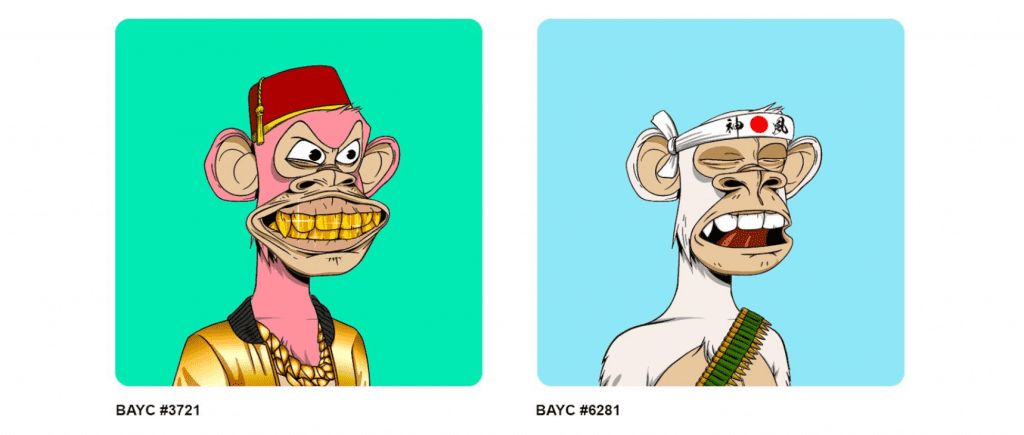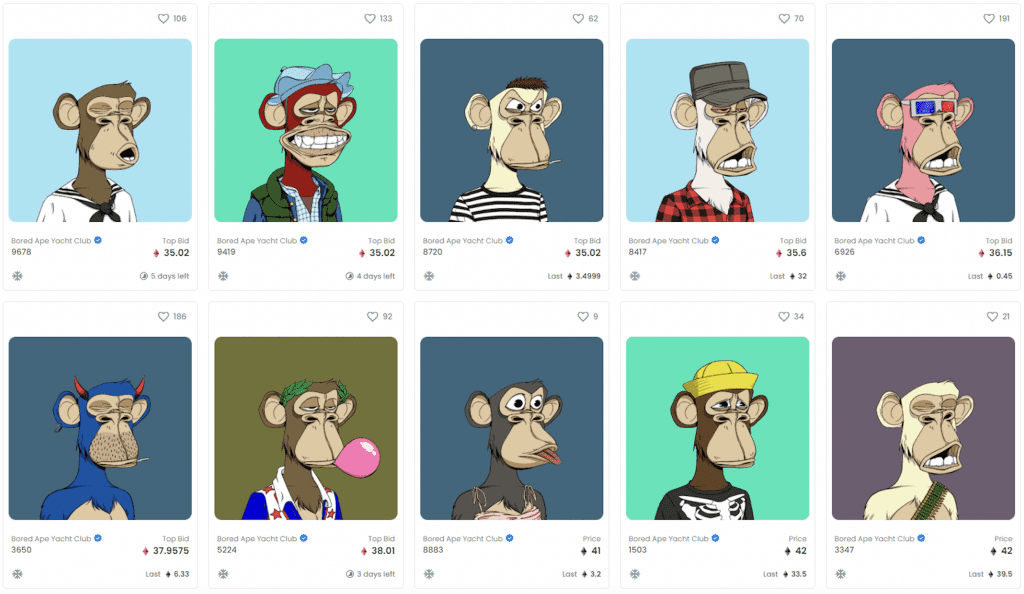Counsel for Ryder Ripps has responded to the lawsuit waged against him and his business partner Jeremy Cahen by Yuga Labs, arguing that the company behind the Bored Ape Yacht Club (“BAYC”) is looking to silence him for calling out the allegedly “racist and neo-Nazi” nature of the popular – and expensive – collection of non-fungible tokens (“NFTs”). According to the anti-SLAPP motion that they filed with the U.S. District Court for the Central District of California on Monday, Ripps and Cahen claim that Yuga Labs’s lawsuit is little more than “an attempt to silence an artist who used his craft to call out a multi-billion-dollar company built on racist and neo-Nazi dog whistles” by way of “the satirical NFT collection” that Ripps created, called the “Ryder Ripps Bored Ape Yacht Club.”
In their newly-filed motion, in which Ripps and Cahen are seeking to have Yuga’s complaint dismissed on anti-SLAPP grounds or alternatively, for failing to allege a plausible cause of action, counsel for the defendants contends that the “obvious purpose” of Yuga’s lawsuit is “to bully Mr. Ripps and Mr. Cahen into silence,” and that such a suit is “precisely why anti-SLAPP statutes exist.” (Enacted in 1992, California’s anti-Strategic Lawsuits Against Public Participation statute protects parties from lawsuits brought to “chill the valid exercise of constitutional rights of free speech,” and provides parties with the ability to file a special motion to strike a complaint or parts of a complaint when a case has been filed “primarily to discourage speech about issues of public significance,” which is what the defendants argue is going on in the case at hand.)
Setting the stage, the defendants assert that in response to Yuga’s BAYC project, Ripps sought to call out the alleged “racism” at the heart of the collection of 10,000 NFTs tied to images of apes. Specifically, Ripps created the RR/BAYC project “in connection with his [existing] efforts to expose Yuga’s neo-Nazi and alt-right references,” namely, Yuga’s practice of “systematically embedd[ing]” the BAYC collection of NFTs, and “related promotional activities and Yuga’s corporate designs … with dog whistles common among neo-Nazis, alt-right groups, and racist bulletins within websites like 4chan.”

Counsel for Ripps and Cahen claims that in response to Ripps’s efforts to “expos[e] Yuga’s misconduct,” the Miami-based company sued him – albeit “not for defamation but for trademark infringement,” as well as false designation of origin, cybersquatting, and conversion, on the basis that Ripps created and sold NFTs bearing “the very same trademarks that Yuga Labs uses to promote and sell authentic BAYC NFTs.”
Ripps and Cahen allege that while “there are dozens of entities that create knock-off ape NFTs that make no artistic or critical commentary,” Yuga “never brought action against any of [those] NFT collections.” Instead, they claim that Yuga “did – without warning – bring this action against [them]” in order to “bully [them] into silence.” This is part of a larger “campaign [by Yuga] aimed at silencing Mr. Ripps’s artistic expression and related criticism of [its] connections to neo-Nazi and alt-right culture,” according to Ripps and Cahen’s motion. The problem with that – and with Yuga’s lawsuit – the defendants assert, is that “the First Amendment and the Rogers test preclude exactly this kind of abusive trademark infringement lawsuit.”
In pushing for the court to strike the complaint, counsel for Ripps and Cahen assert that “the accused RR/BAYC project is protected speech made in connection with a public issue and the complaint does not set out legally sufficient facts to support a cause of action.” Among other things, they claim that “anti-SLAPP immunity protects the accused RR/BAYC project because the project is performance and appropriation art,” which Ripps created “with the specific aim” of addressing a “public issue,” namely, how Yuga’s founders “have embedded Yuga and the BAYC collection with racist and neo-Nazi dog whistles.”
In furtherance of their anti-SLAPP argument, Ryder Ripps and Cahen also assert that Yuga has not plausibly alleged trademark infringement, as they are shielded from liability by the tenets of the Rogers v. Grimaldi case, which apply to the RR/BAYC project (and also to the MetaBirkins NFTs, counsel for Mason Rothschild successfully argued in a separate NFT-centric lawsuit). Under Rogers, which “insulates artistic free speech from claims of trademark infringement,” the defendants assert that “trademark claims are actionable only if the accused use of a trademark is ‘(1) not artistically relevant to the underlying work or (2) explicitly misleads consumers as to the source of the content of the work.’” They argue that RR/BAYC prevails on both prongs, as “Yuga has conceded in its complaint that the BAYC marks are artistically relevant to the RR/BAYC project,” and second, “Yuga has failed to allege (and cannot allege) that Mr. Ripps explicitly misled consumers as to the source of RR/BAYC NFTs.”

To the contrary, Ripps claims that “Yuga repeatedly alleged that [he] publicly communicated that RR/BAYC NFTs are not Yuga products.” In sum, Ripps states that Yuga’s complaint “consistently alleges that [he] differentiated the RR/BAYC project from Yuga’s NFTs, [which] is the opposite of the ‘explicitly misleading’ use that Rogers requires.” For instance, “Yuga extensively pleaded that Mr. Ripps promoted the RR/BAYC project as distinct and antithetical to Yuga’s NFTs, including on the RR/BAYC website and the disclaimer that every purchaser was required to sign.”
The argument against likelihood of confusion as a result of the disclaimer is an interesting one, but might not go far enough, as while the RR/BAYC site requires users to agree to the disclaimer “acknowledg[ing] that RR/BAYC NFTs are ‘a new mint of BAYC imagery, recontextualizing it for educational purposes, as protest and satirical commentary,'” other platforms where the RR/BAYC NFTs might be resold do not have the same requirement. It is worth noting that the defendants claim that when it comes to third-party sites, “Yuga’s complaint also repeatedly shows that the two parties’ offerings are differentiated,” with the OpenSea marketplace images included in Yuga’s complaint, for instance, showing that “Mr. Ripps’s NFTs were labeled as part of the ‘RR/BAYC’ collection and not the ‘Bored Ape Yacht Club’ collection.”
(Not the only NFT case that includes arguments over disclaimers, Hermès takes issue with Rothschild’s claims about his inclusion of a disclaimer on the metabirkins.com site, stating that the NFTs are “not affiliated, associated, authorized, endorsed by, or in any way officially connected with the HERMES, or any of its subsidiaries or its affiliates.” According to Hermès, the “METABIRKINS website is the only advertising channel on which Defendant includes this disclaimer. The disclaimer is notably absent from Rarible, the current point of sale for the METABIRKINS NFTs. The disclaimer is also absent from Defendant’s METABIRKINS social media accounts and Discord channel, where the METABIRKINS NFTs are prominently advertised.”)
And in the event that their anti-SLAPP claims are not enough, counsel for Ripps argues that Yuga’s trademark infringement claims based on the RR/BAYC project “also fail because [Ripps’] use of Yuga’s marks is nominative fair use,” as the project “would not be readily identifiable, or even possible, without using Yuga’s marks to conjure up the BAYC collection – the subject of Mr. Ripps’s critique,” Ripps “used BAYC’s marks only to the extent reasonably necessary,” and Ripps “has done nothing to suggest sponsorship or endorsement by Yuga.”
With the foregoing in mind, Ripps and Cahen request that the court strike Yuga’s complaint and award them fees and costs incurred in connection with the suit thus far, or in the alternative, dismiss Yuga’s claims pursuant to Rule 12(b)(6).
The case is Yuga Labs, Inc. v. Ryder Ripps, et al., 2:22-cv-04355 (C.D. Cal.).











